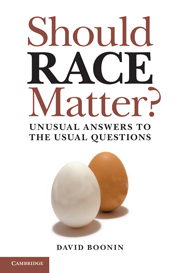Book contents
- Frontmatter
- Contents
- Preface
- 1 Thinking in Black and White
- 2 Repairing the Slave Reparations Debate
- 3 Advancing the Slave Reparations Debate
- 4 One Cheer for Affirmative Action
- 5 Two Cheers for Affirmative Action
- 6 Why I Used to Hate Hate Speech Restrictions
- 7 Why I Still Hate Hate Speech Restrictions
- 8 How to Stop Worrying and Learn to Love Hate Crime Laws
- 9 How to Keep on Loving Hate Crime Laws
- 10 Is Racial Profiling Irrational?
- 11 Is Racial Profiling Immoral?
- Notes
- Sources
- Index
11 - Is Racial Profiling Immoral?
A Reluctant Defense of America’s Least Popular Form of Discrimination
Published online by Cambridge University Press: 05 June 2012
- Frontmatter
- Contents
- Preface
- 1 Thinking in Black and White
- 2 Repairing the Slave Reparations Debate
- 3 Advancing the Slave Reparations Debate
- 4 One Cheer for Affirmative Action
- 5 Two Cheers for Affirmative Action
- 6 Why I Used to Hate Hate Speech Restrictions
- 7 Why I Still Hate Hate Speech Restrictions
- 8 How to Stop Worrying and Learn to Love Hate Crime Laws
- 9 How to Keep on Loving Hate Crime Laws
- 10 Is Racial Profiling Irrational?
- 11 Is Racial Profiling Immoral?
- Notes
- Sources
- Index
Summary
I argued in Chapter 10 that racial profiling is sometimes rational. Let’s now assume that this is correct. Rational racial profiling takes into account some uncomfortable and unfortunate but nonetheless apparently accurate claims about the differences between black and white crime rates in America, at least with respect to certain sorts of offenses, and uses those facts to make police work more efficient and more effective. By focusing more attention on those groups that are, on average, disproportionately responsible for committing certain kinds of crimes, rational racial profiling helps to keep the overall crime rate down. It may often be difficult, as a practical matter, to figure out which cases of racial profiling are rational and which are irrational, but at least in those cases where it turns out to be rational, it’s more plausible to suppose that racial profiling may be worthy of our support.
But even if some racial profiling does prove to be rational, this doesn’t mean that it would be okay to engage in it. A practice might be practically effective, after all, but still be morally objectionable. Performing painful, involuntary medical experiments on homeless people, for example, might turn out to be a fast and efficient means of testing some new drugs or surgical procedures. But even if it did turn out to be effective from a practical point of view, and so rational in this instrumental sense, virtually everyone would nonetheless reject it as morally unacceptable. Similarly, even if it turns out that some forms of racial profiling really are rational in this sense, there might still be a good reason to reject them as immoral. Assuming for the purposes of this chapter that some racial profiling is rational, then, I want now to consider whether rational racial profiling is nonetheless immoral.
- Type
- Chapter
- Information
- Should Race Matter?Unusual Answers to the Usual Questions, pp. 327 - 350Publisher: Cambridge University PressPrint publication year: 2011



